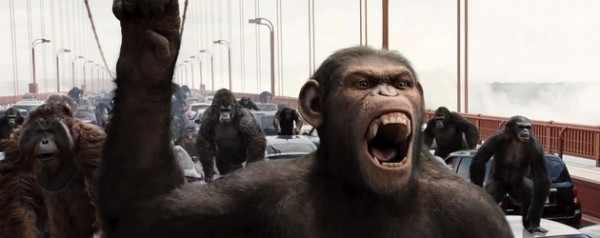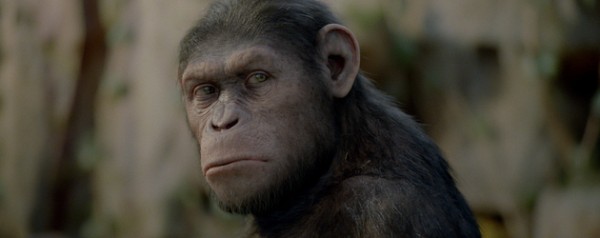This story did not need to be told, other than from the perspective of marketing. The question of how the planet came to be dominated by primates thought inferior to people in Planet of the Apes was best left to the imagination. That being said, the badly titled Rise of the Planet of the Apes tells that story about as well as it could be. There is a lot of Science! to explain how things came to pass, and an excessive level of human stupidity, but the strength of this feature is in character development. Kind of a shocker for a summer blockbuster, but this is a character study, and Caesar is done so well that the human characters are forgotten afterthoughts.
James Franco plays the dumbest cliche of a scientist imaginable, and makes every mistake necessary to set in motion a chain of events that will bring the human race to its knees. He is a bigmouthed self-righteous scientist who is working on a drug to cure Alzheimer’s dementia, a gene-therapy medication delivered via retrovirus that will enable brain cells to repair themselves and grow. Potentially this would lead to uncontrollable seizures, personality changes, and central nervous system cancers, but in the universe of this movie, it repairs the neurofibrillary tangles of dementia and makes the person smarter. Of course it does. The virus is converted to a more hardy form that can be transmitted in aerosol form for ease of administration. The medication works well on all primates except humans, in whom the virus is pathogenic and causes some sort of hemorrhagic fever.
As such, the balance of power is forever altered between man and ape. In any case, Franco’s scientist bleats on forever about how important his research is, and how many millions of lives he can save. He pushes for human testing despite a meltdown when his primary chimpanzee subject is killed in a board meeting. That chimp’s offspring, Caesar, is the only survivor when the entire primate group is culled. So, Dumbass takes the chimp home and raises it as a child. And he tests the drug on his father, who has moderate dementia, and who is kept at home even as his disease worsens and he causes a situation that puts Caesar in danger. And he aerosolizes the drug despite having no idea what it does to people. Worst of all, his actions to raise the chimp as an intelligent being with no sense of its place in the world creates an impossible situation for Caesar. Sentient, self-regarding, but with no niche to occupy in a world that has no use for him. A veterinarian warns him that this intelligent chimp is cute, but will grow up, and become dangerous.
The humans in Rise of the Planet of the Apes are either stupid or cruel, and often both. The researchers subject the animals to tortures in the name of Science!, but really the only thing that convinces the president of this evil pharmaceutical company to proceed with the drug research is the revelation that it can increase intelligence, rather than repair damage. Caesar is institutionalized after attacking someone, and the keepers of the primate sanctuary where he is institutionalized are either selling the animals to research labs or terrorizing them for fun. In all, a dim view of humanity, and successfully pushes us to sympathize with Caesar, who grows isolated from the idiot who raised him, and declare his loyalty for his own kind. Clearly, sapiens was due for a comeuppance. I was certainly rooting for the chimps, apes, and orangutans to bring the noise.
This sort of sci-fi adventure is a vehicle for paranoia of some sort; Planet of the Apes expressed the racial fears of an America where bleks have the vote and are coming for our white women. Subsequent entries focused on nuclear fears I can’t remember most of them because they were all terrible. Rise of the Planet of the Apes on its surface is concerned with fear of genetic manipulation and the greedy, mischievous nature of Big Pharma. The corporation in the film researches drugs with little concern for whether lives are saved; all that matters is profit. This is the way it is, though the screenwriter seems to be a bit surprised by the fundamentals of capitalism; drugs are developed for profit, and if people are helped, then it is an incidental bonus.
Realistically, if no new medications or medical technology were ever created again, one could still make great strides in improving quality of life globally by better distribution of resources and process improvement, but such things require creativity to be profitable. Anyway, this surface fear translates to a more cynical view of human nature, in that we are vain, shortsighted, and self-destructive, with no real ability to adapt or go on the defensive. When the primates rebel, in a way Rise is a commentary on humans’ inability to deal with an evolutionary challenge. It is a frightening concept, as only one species can occupy one niche; if a more efficient model develops for intelligent life, we are utterly doomed. The deepest source of angst here is a lack of faith in where the human species is headed.
The story, the mechanism for the accelerated intelligence for the primates, and the inevitable conclusion are all ridiculous, and it would make for a campy mess if it were not for the extraordinary creation of Caesar. Andy Serkis brings him to life with motion-capture, and the special effects are flawless. The digitally rendered facial expressions exude his developing emotions with subtlety, which is strange considering the awkward performances that surround him. As he learns about the indifferent crimes of humans, and comes to understand the capabilities of his kind, we are made to grasp what he is thinking with nary a word spoken. Between the ape effects here and the achievement of Gollum, WETA has proven itself the premiere special effects studio in the business, able to augment the story with effects rather than obscure it.
Caesar’s character arc is a tragic one, but ultimately redemptive as a new lifeform rises, and the humans necessarily falter. Rise of the Planet of the Apes does capably handle the notion that an alternate intelligence has no place in our society; humans have literally made no room for anything else on the planet, and so our relationships are antagonistic by default. At first Caesar is trapped in his prison and then he chooses to remain there when he breaks with the world of people. Behind those bars, he hones his skills and learns to win over the minds of his fellow primates in order to build an army. We come to know Caesar so well that when a pivotal moment arrives with his first act of defiance, it has the appropriate gravity rather than being silly.
Honestly, the scenes where Caesar finds his way and learns to interact with others of his kind, I could watch for hours. Everything involving people is idiotic and forgettable. At first, I thought this was a flaw, but later it seemed to be by design. The writers had no interest in the people, and by the thrilling climax, we are eager to see the rebellion at hand. This is all deeply absurd, but the primate effects are so well done and the writing for their characters effectively astute that we are sucked in nonetheless. The people lose their relevance, and another agenda is made plain: it is not up to people to save the animals of the world. The best they can do is give them space and leave nature alone, lest vengeance is provoked. A balance between man and nature would be of greatest benefit to self-destructive mankind, and the point is well taken. For the first time in years, I am actually looking forward to a sequel, when things really go pear-shaped for those wretched humans.

